_600.webp) |
| Kévin Azaïs and Adèle Haenel in Thomas Cailley's Love At First Fight (Les Combattants) |
Love At First Fight (Les Combattants) stars César Best Actress winner Adèle Haenel and Kévin Azaïs with Antoine Laurent, Brigitte Roüan, Léa Pelletant and Pascal Bernagaud, directed by Best First Film César honoree Thomas Cailley. Wes Anderson's Moonrise Kingdom. James Stewart's obsession with Madeleine in Alfred Hitchcock's Vertigo, structuring a film in three parts, internal restrictions and an unhealthy diet enter into our 20th Anniversary Rendez-Vous with French Cinema in New York conversation.
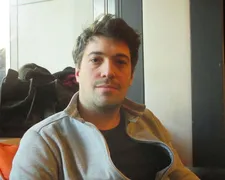 |
| Love at First Fight (Les Combattants) director Thomas Cailley on Arnaud and Madeleine: "During the course of the film, they start out as prisoners of their situation." Photo: Anne-Katrin Titze |
For a film that feels achingly of the now, technology is kept out of the picture for the most part. Cailley shows the toll it has taken on the way people interact with each other face to face. Characters are hungry to find enjoyment by giving up the every day, ordinary pleasures shoved at them by a society with pre-packaged dreams that hold no allure.
We open with Arnaud (Azaïs) helping out his older brother Manu (Antoine Laurent) to keep the Labrède family carpentry business going after their father's death. One day, at the beach in front of a pop-up army recruiting kiosk next to a children's carousel, Arnaud's pals sign him up to fight a girl in an impromptu self-defense demonstration. This is how he meets Madeleine (Haenel), who toughens herself up in hopes to join a particularly rough regiment of the military.
Anne-Katrin Titze: First of all, congratulations on the Césars. Did you, as it says in your film, hit beyond the target?
Thomas Cailley: Exactly. It was really a surprise. It's a long way to make a movie. The movie was at Cannes and we had lots of support right after Cannes. So progressively it developed and over time, the press was good too. We really developed a good momentum for the film. When the Césars came around, that was almost a year after we finished the film. It wasn't our trajectory but an absolutely wonderful reward for all the people who had worked on the film.
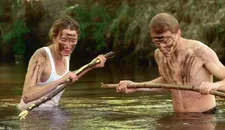 |
| Les Combattants: "I think their combat is something that is very private and intimate." |
AKT: I'd like to begin with Madeleine and her facial expressions. For most of the film she doesn't smile, until the very end in the forest. Most of the people's faces are very still, very serious. Did you instruct your actors this way?
TC: I think from the start the characters are really quite different from each other but there is something that they share which is a common anxiety about the future. They express it very differently. During the course of the film, they start out as prisoners of their situation. They are very serious and everything they do is with great seriousness. There is no irony that they have towards each other at all. These are people who are not taking advantage of what their life has to offer, what the relationship with each other has to offer. Only at the very end of the film where you see them smile that you realise that they are now able to benefit from each other.
AKT: The tone of your film is unique. Only once did I think you were quoting another filmmaker and that was with Madeleine in the club when Arnaud says to her "you could have put up your hair. You could have worn a skirt." Is that your 2014 version of Vertigo?
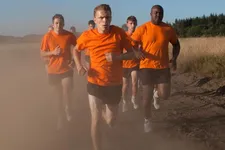 |
| Kévin Azaïs as Arnaud in training: "I went through this same training, to do research…" |
TC (stunned): That was totally unconscious. Wow! Nobody brought that up before. I have to think about it now.
AKT: He is Scotty, the James Stewart character, for a moment. I thought that's why you called her Madeleine.
TC: That's crazy. In fact, her name is Madeleine because I like the sweetness of that first name and she is very tough and not sweet. And also, in Madeleine you have "mad" and she is also mad. Now you gave me another reason.
AKT: How much is the character aware of the performance of toughness? She puts a raw sardine in the blender and drinks that bloody shake, even the frozen chicks she brings as a gift for the ferret and opening a beer bottle with her teeth - it's almost a cliché of toughness. Is she aware that she is taking puzzle pieces of playing tough?
TC: I know girls like Madeleine. What I wanted to create here was a female character who wasn't like the usual fictional female character who has a fragile side. I wanted to show someone who was different and I wanted to deal with the idea of freedom. Freedom can sometimes be an imposition of restriction. In this case, the imposition of restriction doesn't come from outside but from within. Because nobody else is giving those restrictions to her. She suffers from real anxiety and this apocalyptic idea of the end of the world. That at the end it will just be this fight for survival and what she has to fight with is only herself, her body.
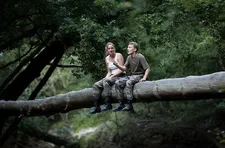 |
| Madeleine (Haenel) and Arnaud (Azaïs): "You see them from very far away, you don't know their language." |
AKT: You show that point well through the food at the training camp. She is gravely disappointed that they serve them candy bars, french fries and caramel pudding. What she and possibly some of the others, too, would have wanted was to give up these every-day pleasures of 15-minute cigarette breaks and junk food in order to get to another kind of enjoyment?
TC: I went through this same training, to do research, and it was a little bit disappointing, that's true. I went to the cafeteria and there I find the candy bars the same way they do in the film. This idea perhaps that Madeleine had of going to some place tough where she would go through deprivation, it really didn't resemble in any way the reality. And she can't really invent her reality. It might seem paradoxical, but I think people can join the army as a way of finding freedom. In this case, it didn't really work for her. And also for Arnaud, who did not join for that reason but it is also not what he expected.
AKT: Tell me about the structure of your film.
TC: The movie is structured in three parts. The first part is Arnaud's world. Then he leaves his world to go into Madeleine's world, which is to join the army. In the third part, they create their own world, a utopia.
_225.webp) |
| Madeleine (Adèle Haenel): "And she can't really invent her reality." |
AKT: Their utopia has a a bit of that fantasy world created by the runaway kids in Wes Anderson's Moonrise Kingdom.
TC: Yeah.
AKT: The desire to find a future for themselves that does not simply follow the unappealing paths laid out for them by society - I think that struck a chord with many young people watching your movie. If the characters belonged to a different group in society, maybe they would have joined another kind of military organisation?
TC: I don't think they would have ended up in any other kind of military organisation. I think their combat is something that is very private and intimate. Here they tried a group and it hasn't worked out. The real question that they are trying to answer is in Madeleine's case 'how can you exist when you are so different from others?' That is not something determined from the outside.
AKT: A lot of the humor is dry and visual humor. Three young guys sitting on the beach blow up three army beach mattresses. The camouflage on the beach, of course, doesn't hide anything. Or the defrosting chickens going round and round. Can you talk about the humor?
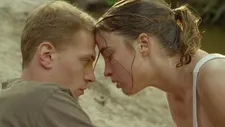 |
| Arnaud with Madeleine: "Arnaud is wood, Madeleine is fire." |
TC: I always kind of liked burlesque shots and humor that's kind of graphic. There's a poetry you can find in these scenes. If you take that moment when they are blowing up the rafts. It conveys the idea of floating and also at that point, Arnaud is someone that is kind of floating. This gives a hint who he is. Same with the shots with the chickens, it shows you something about him as he develops. And then another strange shot with the two of them in a boat. You see them from very far away, you don't know their language, but it is only a language that they could speak.
AKT: Out of all the professions, you chose to make Arnaud and his brother carpenters who inherit the father's business. No other profession could be more loaded with symbolism. Also, you have them make a coffin at the start. How did this choice come about?
TC: I like to show my characters at work because it's something that's very concrete. You can think of the film as a trip that begins with something very concrete and it comes to an end that perhaps is fictional, perhaps not. We don't know if that is the end of the world or what that situation is. We show Arnaud with a lot of wood. He works with wood and that brings already the connection with the trees. Somebody who can have roots that go far down into the ground, that's very stable, something that grows slowly over time. That's the connection I wanted to make.
This is in contrast to Madeleine, who has a very different personality. Arnaud is wood, Madeleine is fire. With the casket, I also wanted to show that the father is a character who is not present. When I was making the film, it wasn't too long after my own father died. And I thought what a wonderful tribute it would have been to him if I had the knowledge as a carpenter to actually do that final thing for him, to make the casket. That was something that related to my own experience. Also I didn't want to show characters standing around crying and looking very sad, because this is a film where people didn't do that. They are always active, they are building, they are doing something.
AKT: You say he is wood and she is fire?
TC: Yeah, like two contrary elements.





















